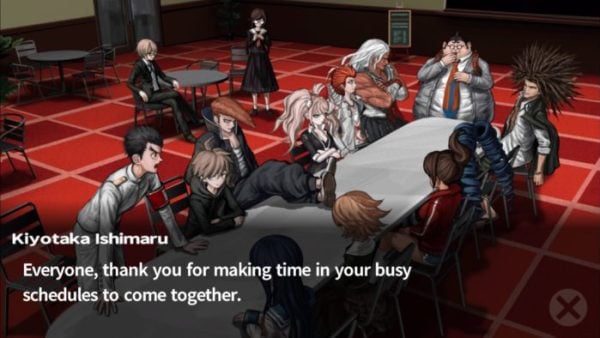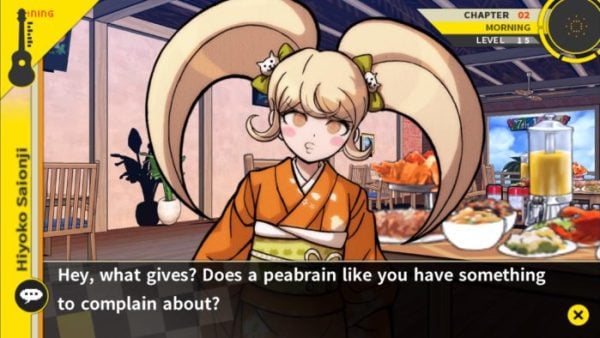Danganronpa 1.2 Reload on PS4
Danganronpa 1.2 Reload marks the fifth platform that the popular visual novel x adventure series has successfully invaded since its original PSP release in Japan back in 2010. Yet, while the characters, intriguing story, and sleuthing gameplay still shine as bright as they did back then, 1.2 Reload’s presentation just doesn’t do the series justice.
Danganronpa 1.2 Reload is a collection of the first two games in the series, Trigger Happy Havoc and Goodbye Despair , ahead of the third mainline entry’s North American release in September. It’s worth noting that 1.2 Reload doesn’t add in any fresh content, either, so if you’ve played the games before, you’ll already know exactly what you’re getting. While some cosmetic differences and new features are added into the sequel (as well as plenty of lighthearted jibes at its predecessor’s cliche lines or events) you’ll get largely the same experience from both – an incredibly rich and rewarding, story-driven experience with excellent writing at its core.
For those unfamiliar with the Danganronpa series, the premise is pretty out there. Players assume the role of a student at a prestigious school known as Hope’s Peak Academy. This isn’t any ordinary school, though. Only the Ultimate students of their respective fields are invited to attend the school, and as such, you’ll be surrounded by an eclectic mix of intellectual masterminds and skilled professionals. However, soon enough you find that even this extraordinary school shouldn’t be taken at face value. Without spoiling too much of the fun, you’ll soon find yourselves trapped by an evil and incredibly sprightly headmaster bear named Monokuma. You’re not allowed to leave the school, and the only way you can get out and ‘graduate’ is to murder another student and not be caught.

These rather terrifying tales of super-talented students turned against one another follow a standard formula throughout their chapters. You’ll have some kind of social event or incident among the students, you’ll spend your ‘Free Time’ interacting with the other students in order to get to know them better, a murder will happen, you’ll search for clues, and then argue your case in the Class Trial. Though this might seem somewhat repetitive, especially with each game coming in at about 25 hours, the characters and excellent writing help to make each and every chapter feel exciting and satisfying to complete.
Danganronpa 1.2 Reload’s characters are all incredibly loud and colorful, and while some of them may give you the creeps with their pervy remarks or overly-sensitive attitude, you’ll begin to care about each and every one of them. They may have a cardboard-thin appearance to fall in line with the background’s pop-up aesthetic, but these are some of the most realized, wacky, and wonderful characters you’ll meet in a video game. This is the genius of Danganronpa, though. Because each character feels unique and has such an over-the-top personality, their absence when they’re murdered is felt. You’ll miss those quips you used to roll your eyes at, or their cliché pep-talks about “not giving up hope.” You want to solve these murder cases, not because you have to, but because you seek justice for your fallen friend. Oh, and because each case is so damn rewarding when you begin putting the pieces together.
The real meat of Danganronpa 1.2 Reload’s gameplay comes in the form of its Class Trials. Once you’ve searched the crime scene and other significant locales for clues, you’re thrust into a makeshift courtroom with the other students and must use the evidence to highlight contradictions and build an irrefutable case against the culprit. In these, you’ll fire your evidence, known as Truth Bullets at weak points in student statements, play Hangman to piece together clues, and put together a comic strip puzzle to show how a murder took place. Each and every one of these never feels overly complicated, and the difficulty scale across the cases helps to build your confidence with each and every new mechanic the game throws at you. Toss in a thumping techno soundtrack, a ton of neon coloring, and swift camera movements and you’ll find yourself completely immersed in the tale unfolding before your eyes. After the first case, there’s no refuting the immense feeling of satisfaction when you discover the truth, and the games continue to deliver this consistently throughout their duration.
Unfortunately, these Class Trials only make up about a third of the game, so if you’re not a fan of visual novels, the remaining elements on offer may feel like a bit of a drag. Free Time sections, in particular, suffer from this. In order to pad the story out, you’re given free reign to speak to whichever students you want. It’s almost an attempt at Persona’s social system, but it’s far too shallow to feel rewarding and newcomers will likely sleep through these to skip to the next major story point.

My main issues with 1.2 Reload largely revolve around its polish and presentation, or lack thereof. While I appreciate these were by no means meant to be a remaster, blurry backgrounds and textures popped up all too often. Character models made the transition to the bigger screen and more powerful system alright, but you’ll definitely see indistinguishable details in the environment that really tarnish the experience as a whole. Factor in a good handful of typos and grammatical errors that I can only assume have occurred during translation and not been caught, and Danganronpa 1.2 Reload yearns for that extra bit of polish to really do these games the justice they deserve. If you can overlook these presentational shortcomings and embrace the wacky characters’ hilarious dialogue, especially the insane, sadistic, pun-loving bear Monokuma, then Danganronpa 1.2 Reload is well worth checking out.
Throughout the 30+ hours I’ve poured into Danganronpa 1.2 Reload’s two games, I’ve discovered an absolute gem of a video game series that rewards players not with action-packed gameplay, but superbly-written, sinister tales that had me hooked from start to finish.
Score: 4/5 – Great
Pros• Both games’ stories are still fantastic and compelling from the get-go. • Two excellent casts of colorful, interesting, and unique characters. • Monokuma is a hilarious, evil mastermind.
| Cons• The presentation just isn’t there. • Free Time sections feel shallow and won’t appeal to those outside of the dedicated fanbase. |

